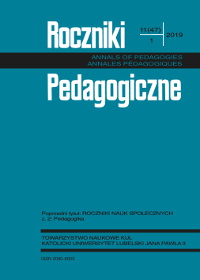The Essence of an Integral Education in The Personal Development of a Man
Main Article Content
Abstract
Integral education of a man – that is multidimensional and complete understanding of the educational process indicates taking into account all basic spheres of humanity: physical, sexual, intellectual, emotional, moral, spiritual, religious, and social. Such understanding of the educational process is optimal and leads to personal development. To carry it out correctly, affirmation of the values of dignity is necessary, which is the starting point in the relationship educator–graduate. It is also very important that the educator is a role-model – a true master, who will lead the student towards full personal development.
Integral education – indicating the way to the implementation of the humanity of a man – should start at an early age. If a person, in their early years of life, understands the value of a person and the essence of integral development, then they will know the meaning of human life and the task arising out of “being” a human.
Article Details
References
Chudy, W. (2004). Być a stawać się osobą. Zeszyty Karmelitańskie, 4 (29), 30-36.
Chudy, W. (2006). Istota pedagogiki personalistycznej. Ethos, 75, 52-74.
Chudy, W. (2009). Pedagogia godności. Elementy etyki pedagogicznej (red. A. Szudra). Lublin: TN KUL.
Cives, G. (1973). La mediazione pedagogica. Firenze: La Nuova Italia.
Jan Paweł II. (1999). Posynodalna Adhortacja apostolska Christifideles laici. Wrocław: Wydawnictwo Wrocławskiej Księgarni Archidiecezjalnej.
Jan Paweł II. (2005). Przemówienie Jana Pawła II do młodzieży w Poznaniu, Poznań, Plac Adama Mickiewicza, 3. 06. 1997. W: Jan Paweł II, Pielgrzymki do Ojczyzny. Przemówienia i homilie (s. 917-924). Kraków: Znak.
Jan Paweł II. (1980). W imię przyszłości kultury. (Przemówienie do przedstawicieli UNESCO, Paryż 2.06.1980). L’ Osservatore Romano, 6, 4-6.
Jan Paweł II. (1992). Świadczyć o Chrystusie przykładem życia. Do nauczycieli katolickich (Przemówienie podczas audiencji dla nauczycieli XII Krajowego Zjazdu Włoskiego Stowarzyszenia Nauczycieli Katolickich, Sala klementyńska, Watykan, 7 XII 1979). W: E. Weron i A. Jaroch (red.), Nauczanie papieskie. T. II. Cz. 2 (s. 645-648). Poznań: Pallottinum.
Melosik, Z. (2001). Młodzież i styl życia: paradoksy pop-tożsamości. W: Z. Melosik (red.), Młodzież, styl życia i zdrowie. Konteksty i kontrowersje (s. 11-57). Poznań: Wolumin.
Niziołek, B. (2008). Kilka uwag o wychowaniu. Wychowawca, 2, 5-6.
Noga, H. (2004). Wzór osobowy jako nośnik wartości. Wychowawca, 6, 11-12.
Nowak, M. (2000). Podstawy pedagogiki otwartej. Lublin: RW KUL.
Ożóg, T. (2000). Kulturowe zagrożenia wychowania. W: M. Nowak i T. Ożóg (red.), Wychowanie chrześcijańskie a kultura (s. 167-188). Lublin: RW KUL.
Pesci, F. (2006). Filozoficzna perspektywa wychowania (tł. P. Mikulska). Ethos, 75, 37-51.
Rusiecki, M. (2008). Etos nauczycielski. Kieleckie Studia Teologiczne 7, 277-299.
Rynio, A. (2004). Integralne wychowanie w myśli Jana Pawła II. Lublin: KUL.
Spychała, A. Relacje nauczyciel–uczeń w procesie nauczania, w: http://www.profesor.pl/mat/n10/ pokaz_material_tmp.php?plik=n10/n10_a_spychala_040509_2.php&id_m=10872 (02.08.2018).
Szostek, A. (1996). Pogadanki z etyki. Lublin: RW KUL.
Valwerde, C. (1998). Antropologia filozoficzna (tł. G. Ostrowski). Poznań: Pallottinum.
Wojtyła, K. (1994). Osoba i czyn oraz inne studia antropologiczne. Lublin: Towarzystwo Naukowe KUL.
